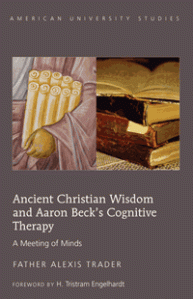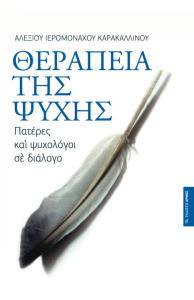The Science of Fear and the Hesychastic Remedy
In a world without dangers threatening emotional and physical pain, there would be no need for fear. But we don’t live in such a world. There’s an old saying in aviation: “There are old pilots, and there are bold pilots, but there are no old, bold pilots.” Neurologically speaking, fear involves the memory of a dangerous occurrence (brought to the consciousness through the CHR neurons of the hypothalamus), information from the senses (feeding into the basolateral amygdala) that are consistent with that memory and the urge to flee (activated by the bed nucleus of the stria terminalis and leading to the secretion of the stress-hormone cortisol). In real dangers, this neural circuit can literally be a lifesaver, but it comes at a cost and was never meant to be a continuous natural state. High levels of cortisol associated with living in a state of fear or anxiety increase blood-pressure and gastric acid production in the stomach, ages the immune system, and damages the memory (hippocampus) and the ability to learn. We were not created to be fearful. Yet, fear has become the defining “default setting” for human beings in our contemporary age. Fear begets war, jealousy, rage, lust, anger, competition, and every other human ailment. Fear even besets those who are attempting to live a spiritual life.
However, the truly Good Physician continually admonishes us in the Gospel with His calming, holy voice: “Be not afraid.” Fear is antithetical to the Good News of the Gospel for “there is no fear in love; but perfect love casteth out fear.” Fear is fomented in the intellect when we choose to let ourselves focus on past dangers and future threats, rather than meditating on past blessings and future promises. In the Gospel, the Lord Christ continually reminds His disciples that fears about worldly cares have no place in the life of His followers. “And why take ye thought for raiment? Consider the lilies of the field, how they grow; they toil not, neither do they spin.”
If the intellect and discursive rationality are the purview of the selective memories of the past and projected images of the future, the nous is the purview of the present. Fear keeps us bound and enslaved to temporal realities over which we have absolutely no control. We can’t change the past and we can’t control the future. What we have is the present moment. And even if events trigger a fear response, faith can always calm a stormy sea.
 This is where the Jesus Prayer becomes truly important and instructive for us. In the context of the Jesus Prayer, we ask mercy for what we have been and done in the past and place our trust in Him who knows our future, all the while remaining in the present moment. “Lord Jesus Christ, have mercy upon me a sinner.” I trust in the Lord’s mercy and goodness for “He is a God that lovest mankind” and if I cling to Him that same love and mercy will sustain me in the future-no matter what that future may entail. The Lord desires my salvation, not my destruction. Let us turn to the Myrrh-bearing women, especially Saint Mary Magdalene for a moment. Mary arrives at the tomb weeping and mourning. She is greeted with the words “He is not here”. At that moment, the resurrected Lord calls her by name “Mary” and she recognizes Him.
This is where the Jesus Prayer becomes truly important and instructive for us. In the context of the Jesus Prayer, we ask mercy for what we have been and done in the past and place our trust in Him who knows our future, all the while remaining in the present moment. “Lord Jesus Christ, have mercy upon me a sinner.” I trust in the Lord’s mercy and goodness for “He is a God that lovest mankind” and if I cling to Him that same love and mercy will sustain me in the future-no matter what that future may entail. The Lord desires my salvation, not my destruction. Let us turn to the Myrrh-bearing women, especially Saint Mary Magdalene for a moment. Mary arrives at the tomb weeping and mourning. She is greeted with the words “He is not here”. At that moment, the resurrected Lord calls her by name “Mary” and she recognizes Him.
So too, in our own lives, Jesus is not to be found in death (fear). “He is not here.” He has overcome death and cast out all fear, trampling down death by death. Whatever we fear, whomever we fear has been conquered by the glory of the Cross and Resurrection. If we have fear ever dwelling in our hearts, we are harming our physical, mental, and spiritual health. Neuroscience, psychiatry, and the Gospel agree on this point. Such fear is certainly not of God. Fear is the great lie that our opponent the devil sows in our heart to prevent us from communion with the God who loves us. Fear keeps us chained to illusory and deceptive thoughts that alienate us from God and one another. Yet, that chain has been broken, Satan has been conquered, fear has been overcome. We need only recognize this and be glad in Him who has made us a new creation. Lord Jesus Christ have mercy on me. Glory to Thee, O God, glory to Thee! Amen.




thankyou for these posts. a Godsend in my life.
You are quite welcome, Susan! God sends many things into our lives for which we can give Him thanks.
In Christ,
Fr. Alexis
Father Bless
Powreful and revelant; thank you!!! I loved your reminder that “whatever we fear, whomever we fear has been conquered by the glory of the Cross and Resurrection”
I think these simple verses from Septuagint Psalms 52 capture your thoughts and the state of our ‘contemporary age’ and often my own heart:
“They have not called upon the Lord. There have they feared with fear where no fear is”
We are truly in an age of ‘fear where no fear is” quite often because we like the “fool hath said in his heart : There is no God”.
I see many of my self-centered fears as the realities which separate me from God and thus are the seeds of my sinful state.
When we raise our fears above our faith in God; ironically we remove ourselves from the solution and compulsively find ourselves in the problem.
But from our brokennes and the emptiness of our fears , He hears our cry…”Lord Jesus Christ; have mercy on me a sinner”
I love what you have done with your book and this blog!!!
Thank you…
The Lord God bless and keep us all!
You are quite welcome, Bruce. Yes, Psalm 52 does capture the problem of pathological fear quite well as well as the ancient solution from Scripture: calling on the Lord. Thank you for this beautiful connection. I also thank you for your own thoughts and encouragement
In Christ,
Fr. Alexis
Father Bless
I have struggled with fear nearly all my life. I find it really hard to pray when beset with fear. I would really welcome you suggestions on how to pray when anxious.
Thank you.
The Lord God bless!
It is naturally difficult to pray when anxious or afraid, because the mind is taken captive by the feared occurrence, leaving few resources to turn in prayer to the Lord. In order to pray, one needs first to set aside earthly cares, which means humbly accepting that there is much we cannot control, embracing God’s will, which may differ from what we desire in the short run, and letting go of the fear by placing it in God’s hands. All of this should be done calmly, quietly, lovingly, and with the trust of a child in the arms of the mother. May God help all of us to do this when we encounter what we fear.
In Christ,
Fr. Alexis
Thank you Father and pray for us.
Some say you should be very AFRAID of using hesychastic style of prayer focused on the heart. For they FEAR the loss of the mind and damage of body to point of death if focus goes to belly instead of heart. Do you agree with this FEAR assessment and what are counters to the fears? Is it safer to use mindfulness exercises apart from Orthodox hesychasm?
There is no reason for the humble and the contrite to fear calling on the name of Christ for assistance. In hesychastic prayer, the one being worshipped is the Lord Jesus. The aim of the worship is the Lord Jesus. And the very point of the worship is union with the Lord Jesus. And we know from the Gospels of Christ’s great compassion for the poor, for the sick, for the suffering, and for the sinner. In His presence, there is no need for unhealthy fear, but wholesome love that casts out all fear. What one needs to be most afraid of in the spiritual life is hypocrisy and turning something or someone, even one’s self, into an idol and worshiping that idol in place of Christ. Hypocrisy and idolatry can be present using the best of methods, such as hesychasm, or the most popular of practices, such as mindfulness exercises. In either case, those failings are dangerous. The fathers have always taught that the mechanics are secondary to the essence. If one gets the heart of the matter right, there is no need to fear technicalities or be bound by them.
Thanks Fr. Alexis! Your answer is very healing from legalism and unnecessary fears promoted by some in the name of Orthodoxy. Your words align so well with so many Scriptures and the Spirit of Christ within! Pray you will write more on this to help many in continued healing from unnecessary fears, ritualism and superstitions too prevalent in modern ethos.